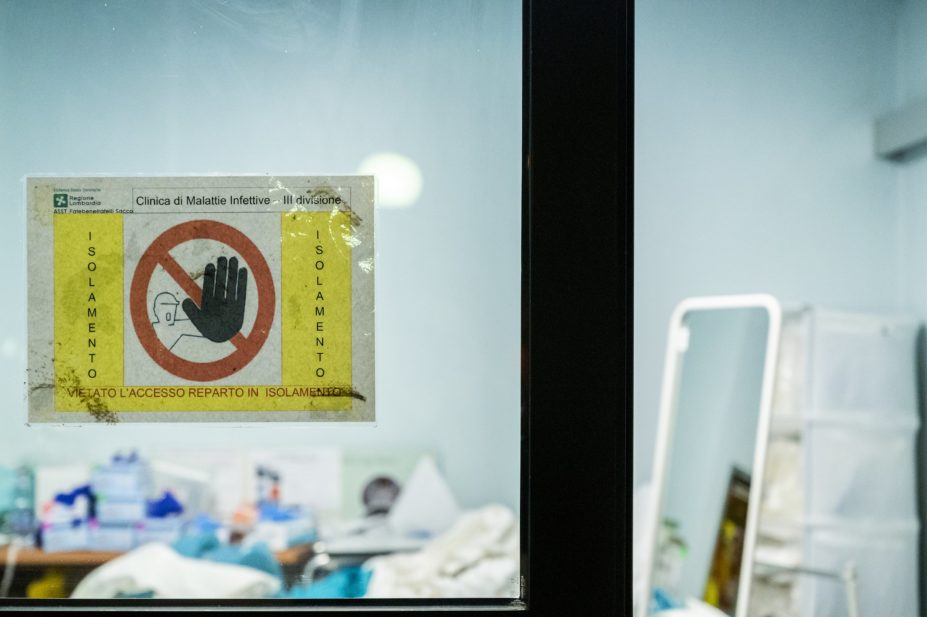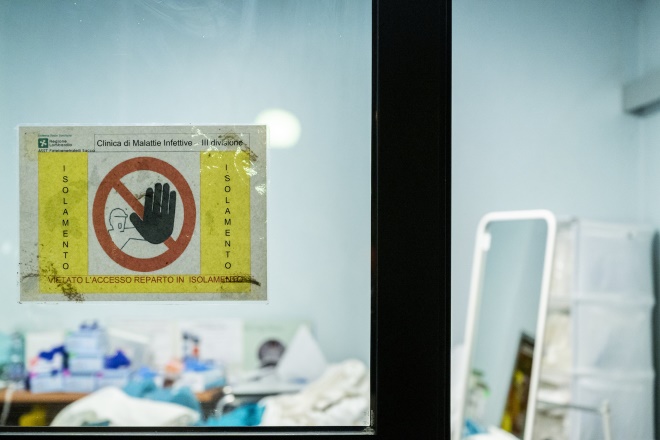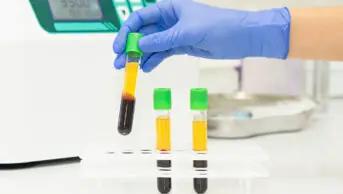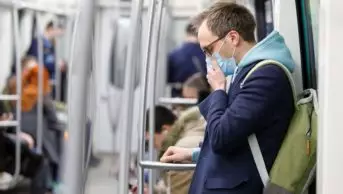
SOPA Images/SIPA USA/PA Images
Open access article
The Royal Pharmaceutical Society has made this article free to access in order to help healthcare professionals stay informed about an issue of national importance.
To learn more about coronavirus, please visit: https://www.rpharms.com/resources/pharmacy-guides/wuhan-novel-coronavirus

Source: SOPA Images/SIPA USA/PA Images
Pharmacies in England have been asked to set up rooms or zones, similar to this one in Italy, where patients with suspected coronavirus infection can be safely isolated
Community pharmacies have been told they must prepare a “designated isolation space” to house patients who present with suspected coronavirus disease 2019 (COVID-19).
A standard operating procedure (SOP) for COVID-19, issued by NHS England and NHS Improvement on 27 February 2020, instructs pharmacy owners to “identify at least one suitable space/room in the pharmacy for patient- or patient-group isolation”.
High-risk patients will have clinical symptoms of coronavirus infection— a cough, high temperature and shortness of breath — and will have recently travelled to an at-risk country, as defined by the chief medical officer for England, or have had contact with a confirmed case of COVID-19.
If the pharmacy does not have a suitable room to isolate a suspected patient, an area that would keep a patient at least two metres away from staff and other patients in the pharmacy should be prepared so that it can be cordoned off.
The SOP advises pharmacies to “declutter and remove non-essential furnishings and items: this will assist if decontamination is required post-patient transfer”.
It adds that a telephone should be kept in the isolation room or space, and a card with contact details for the pharmacy should be provided for suspected patients.
The SOP also tells pharmacy staff to plan for how they will communicate with, and check on, any isolated patients.
“This may be simply a knock and conversation through the closed door, or could be verbal and/or visual contact via remote means, [such as by] telephone, Skype/FaceTime, pharmacy intercom or baby monitor,” it states.
A patient ‘support pack’ should be prepared, which could include items such as bottled water, disposable tissues and a clinical waste bag.
After an incident, the SOP states that the area where the patient was placed should not be used, the room door should be kept shut, the area cordoned off, windows should be opened and air conditioning switched off until the site has been cleaned with detergent and disinfectant.
Any waste from the potentially contaminated area should be quarantined until patient test results are known.
The SOP adds that pharmacy staff who have been in contact with a suspected case “are not required to self-isolate unless directed by a health protection team”.
Pharmacies have also been told to add coronavirus warnings to any contact with patients, including via text messages, online booking services and telephone systems. Additionally, each pharmacy must appoint a COVID-19 lead with responsibility for preparing and implementing precautions.
Public Health England had previously told patients not to go to their community pharmacy if they are concerned about coronavirus.
However, NHS England said the SOP was to be followed “in the unlikely event that someone presents to the pharmacy with suspected COVID-19”.
But Lindsey Fairbrother, owner and superintendent pharmacist at Good Life Pharmacy, in Hatton, Derbyshire, said she had to close her pharmacy’s consultation room for 24 hours to disinfect it, after a patient referred to her pharmacy via the community pharmacist consultation service revealed that they were in the at-risk category.
The patient had not told NHS 111 that they had travelled to a high-risk area in northern Italy when they were referred to the pharmacy.
The consultation room closure forced the pharmacy to cancel a number of treatments.
Fairbrother said that while much of NHS England’s COVID-19 guidance is sensible, setting aside a dedicated area could send the wrong message to patients.
“We need to go back to basics and tell people who are at risk not to come to the pharmacy,” she said.
“Preparing a dedicated area will encourage patients to present at the pharmacy because they think there is a safety net. It is not practical and will put the wellbeing of pharmacy staff at risk.”
Mike Hewitson, a pharmacist at Beaminster Pharmacy in Dorset, said that although the SOP would be “relatively straightforward” to implement, it would also be time-consuming and costly.
As a result, he suggested some elements of the community pharmacy contract, including the clinical audit planned for March 2020, and non-coronavirus related health promotion work, should be put on hold.
“I’ve a feeling this will cost most contractors quite dearly,” he said. “So I would expect the government to be making it clear to pharmacy bodies that if there is a bill attached to this then the government would be footing it.”
A spokesperson for the Scottish government said its most recent advice to pharmacies was published on 19 February 2020 and that it does not recommend that pharmacies prepare an isolation space. However, it does instruct pharmacies to place at-risk patients, who attend the pharmacy but are too unwell to return home, in a room with the door closed before calling the local health protection team.
The Welsh government told The Pharmaceutical Journal that advice around the coronavirus was a matter for Public Health Wales, who have been approached for comment.


